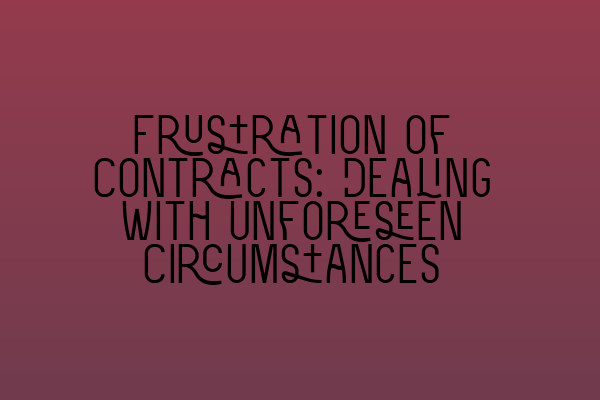Frustration of Contracts: Dealing with Unforeseen Circumstances
Contracts are the foundation of business transactions and legal agreements. They provide a framework for parties to define their rights, obligations, and responsibilities. However, what happens when circumstances arise that make it impossible for a contract to be fulfilled? This is where the concept of frustration of contracts comes into play.
Frustration of contracts occurs when unforeseen circumstances arise, making it impossible for parties to fulfill their contractual obligations. These circumstances are beyond the control of both parties and were not contemplated at the time the contract was formed.
Understanding Frustration of Contracts
When a contract becomes frustrated, it is essentially terminated. The parties are released from their obligations, and neither party can sue for breach of contract or seek damages. Frustration of contracts is a legal doctrine that recognizes the reality that circumstances can change, making it unfair or impossible for parties to continue with their contractual obligations.
Examples of events that may lead to frustration of contracts include natural disasters, government actions, unexpected illness or death, or the destruction of the subject matter of the contract. In these cases, the performance of the contract becomes inherently impossible or radically different from what the parties originally intended.
Frustration vs. Force Majeure
Frustration of contracts is often confused with the concept of force majeure. While they are similar, there are some key differences to note. Force majeure refers to a clause that may be included in a contract, allowing parties to suspend or terminate their obligations if certain events beyond their control occur. Frustration, on the other hand, is a legal doctrine that applies in the absence of a force majeure clause.
While force majeure depends on the specific wording of the contract, frustration applies regardless of whether the contract contains a force majeure clause. It is important to carefully review contracts for force majeure clauses and understand their implications in the event of unforeseen circumstances.
Signs of Frustration
Determining whether a contract has been frustrated can be complex. Courts will consider various factors when determining if frustration applies. Some signs that a contract may be frustrated include:
- The purpose of the contract has become physically or commercially impossible.
- The nature of the contract has been fundamentally altered.
- The contract becomes illegal to perform.
- The event leading to frustration was unforeseen and beyond the control of the parties.
It is important to seek legal advice when assessing whether a contract has been frustrated. Qualified solicitors can guide you through the process and help protect your interests.
Consequences of Frustration
When frustration occurs, the contract is automatically terminated, and both parties are discharged from their obligations. However, it is crucial to understand that frustration does not entitle either party to compensation or damages. Each party must bear their own losses resulting from the frustration. The aim of frustration is to prevent injustice rather than provide a remedy.
It is also worth noting that frustration may not apply to all aspects of the contract. In some cases, certain obligations may still be binding, even if the main purpose of the contract has become frustrated. Seeking legal advice will help navigate these complexities and understand the implications for your specific situation.
Navigating Frustration in Contracts
Dealing with the frustration of contracts can be complex and requires a thorough understanding of contract law. It is crucial to consult with a solicitor who specializes in contract law to ensure your rights and interests are protected.
To navigate legal challenges and pitfalls in your practice, visit our related article: Navigating Legal Challenges and Pitfalls in Your Practice.
If you’re interested in exploring different solicitor specializations and finding your niche, our related article provides valuable insights: Exploring Different Solicitor Specializations: Finding Your Niche.
Additionally, if you’re considering a career in law and want to know more about top law schools in the UK, our article can guide you: Top Recommendations for Law Schools in the UK.
For a comprehensive comparison between barristers and solicitors, our article provides valuable insights: Barrister vs. Solicitor: A Comprehensive Comparison.
Lastly, if you’re interested in the rise of virtual law practices and how they can benefit your practice, our related article explores this topic: Embracing the Rise of Virtual Law Practices.
